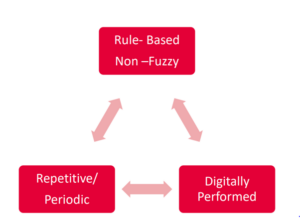We are pleased to announce that we had a kick off meeting with our RPA partner PwC last month.
There has been a lot of interest around automation within ECC and with PwC, we have a major partner that will help us deliver our aspirations and achieve long-term outcomes. PwC has history of delivering successful automation projects in the public space for a few councils and we are looking forward to utilising their expertise.

What is RPA?
In a nutshell, Robotic Process Automation uses “software-robots/bots” to automate repetitive, rule-based tasks. These software applications are programmed to perform repetitive tasks by mimicking human interactions and enabling more time for engaging work along with other benefits like productivity, accuracy, and consistency.
A good rule of thumb for identifying these tasks is that they are usually rule-based, repetitive and periodic in nature and are digitally performed.

What we want to achieve?
A Product Vision is the outcome that we aim to achieve, it is the end state of the product when its successful and it answers why the product exists in the first place.
Our Product Vision for RPA is to “use RPA to drive efficiency in processes and applications across ECC digital assets.”
Key to demonstrating the impact of RPA is identifying and defining measurable value from the delivery of automations. Automated processes not only have minimal errors, are cost efficient and easy to scale, but they also free up people’s time for more value added and complex tasks.
We have some important goals and objectives to achieve in realising this vision:
- ECC services require less human effort/intervention to operate.
- ECC processes are quicker, execute seamlessly to implement and cost effective.
- Employees feel confident and competent in implementing automation as a service.
- Setting up a Centre of Excellence to drive the automation ambition of the organisation.
A Centre of Excellence for RPA
A major outcome is to establish a Centre of Excellence for RPA to manage the demand and supply of valuable automations in the long run. This COE will define the return on investment and effectiveness of RPA by using a central and standardised approach for measuring the opportunity’s worth. It will define the roadmap for success and host a set of functions around process design, governance, infrastructure, configuration, testing, release management and resourcing.
Next Steps for RPA
We are using the AGILE approach which focusses on utilising the existing backlog to bring a few automations to life. This phase is essential to identify the building blocks for our vision and helps us learn quickly from evidence around process discovery and design, implementation, and maintenance.
The learnings will help us define the model best suited for the Centre of Excellence and the capabilities that form this COE.
This is exciting work, and we will continue to share our progress and learning here.
2 comments
Comment by Claire Craig posted on
Enjoyed reading this Shaurya, looking forward to reading more as the project moves along!
Comment by Shaurya Rajwar posted on
Thanks Claire, really excited to share our journey .